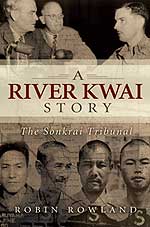Here is a copy of my response.
Let's not go overboard on “ethics” when it comes to memories, whether in a memoir or an interview. In my view, it is not an ethical issue, unless we expect someone to have perfect omniscience.
A couple of opening teasers:
When I was teaching investigative and narrative journalism, on the last day of class, for those students who showed up—usually the better ones—I played a tape of Akira Kurosawa's Rashomon, black and white, in Japanese, with English subtitles. At the beginning the expression was what is this all about...in the end they got it, the same story told as “truth” from several viewpoints, the victim, the perp, the cop, the onlookers.
Then there is Rudyard Kipling, who in his poem the Neolithic Age said: "There are nine and sixty ways of constructing tribal lays,/And every single one of them is right!"
Now to the point of my argument.
For the past five years I have been working on the story of one of the prisoner of war camps on the River Kwai. Three years of academic study and a MA thesis, followed by two years of turning the academic into narrative. The manuscript was shipped to the publisher a couple of weeks ago.
For almost all of the past 60-odd years 95% of the books on the prisoner of war experience, have been individual memoirs. As such they were one man's isolated vision.
In addition, with only a few exceptions, these books were written long after the fact. Almost all these men, whether the prisoners on the Kwai which I write about or Americans in POW camps in Japan, did not write down their experiences until after they retired.
Many suffered from Post Traumatic Stress Disorder. And it has been proven clinically that the memories reasserted themselves after the ex-POWs retired, and no longer had work and raising the kids on their minds. With others retirement gave them the time to write what they always wanted to write. (The same is true and again shown in the psychiatric literature of Holocaust survivors)
While a good proportion of the books were published commercially, many were self published after the commercial publishers turned them down but the ex-POWs wanted to get their own stories out there.
The quality of writing and fact in these memoirs varies.
There is one problem however. A few years ago one short memoir was exposed as a forgery by a “wannabe.” This was mentioned in one academic paper by an author who herself has an agenda, she is the daughter of an officer who feels that memoirs by enlisted personnel are unfair to officers. The problem is that now it appears the academic community it throwing out the baby with the bath water. Academic writers are now citing this paper and contending that all POW memoirs are unreliable. (It's like when the US media expose a phony Medal of Honor winner as a “wannabe” and some academic then claiming therefore all memoirs by all of Medal of Honor winners are unreliable).
After my academic research, I applied my investigative skills, including filing FOI requests and getting documents from multiple sources.
One key officer was the semi-official historian of the camp I am writing about. For years, it was his account that was used. It was not that until his men began to write their memoirs, after retirement, that people learned, at least according to these accounts, that that this man actually stayed in his hut and left everything up to more junior officers.
This was confirmed first by an academic researcher. Add investigative journalism and one thing that I found in looking at documents and testimony was that this officer committed perjury at the war crimes trial of camp guards, claiming personal credit for events that took place in another camp. The men who were in the second camp described the events both in official reports and in later memoirs and there was no mention of this officer. He also committed probable perjury in other areas, largely to cover up his own failures.
So, in this case, the documents the academics are depending on are not that accurate.
My solution was to use the journalistic practice of making sure that I have more than one source. Where I have two or more sources I write the story as narrative with an end note naming all sources so as not to break the narrative. Where there is just one source I weave it in as best I can and attribute it in the text to the individual, in a way that I hope doesn't break the narrative.
--
Technorati tags
research, writing, journalism, Burma Thailand Railway , World War II, Thailand




